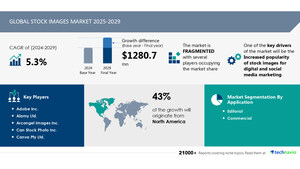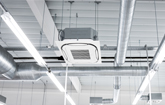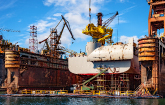NEW YORK, June 26, 2024 /PRNewswire/ -- The global marine air conditioning (AC) systems market size is estimated to grow by USD 3702.3 mn from 2024-2028, according to Technavio. The market is estimated to grow at a CAGR of over 2.59% during the forecast period. Robust growth in commercial shipping is driving market growth, with a trend towards increasing marpol regulations. However, high safety issues and piracy threats associated with digital air conditioning systems poses a challenge. Key market players include Aquamare Marine Ltd., BRONSWERK GROUP Ltd., Carrier Global Corp., Chongqing Acir Marine Co. Ltd., Daikin Industries Ltd., Dometic Group AB, Eberca Holding BV, Flagship Marine Inc., FRIGOMAR Srl, GEA Group AG, Heinen and Hopman, Johnson Controls International Plc., Mabru Power Systems, MARINAIRE TECHNOLOGIES INC., Nissin Refrigeration and Engineering Ltd., Ocean Breeze, Pompanette LLC, The Koja Group, Veco S.p.A, and Webasto SE.
Get a detailed analysis on regions, market segments, customer landscape, and companies - Click for the snapshot of this report
Forecast period |
2024-2028 |
Base Year |
2023 |
Historic Data |
2018 - 2022 |
Segment Covered |
Product (Chiller systems, Self contained systems, and Split systems), End-user (Leisure ships and Commercial ships), and Geography (APAC, Europe, North America, South America, and Middle East and Africa) |
Region Covered |
APAC, Europe, North America, South America, and Middle East and Africa |
Key companies profiled |
Aquamare Marine Ltd., BRONSWERK GROUP Ltd., Carrier Global Corp., Chongqing Acir Marine Co. Ltd., Daikin Industries Ltd., Dometic Group AB, Eberca Holding BV, Flagship Marine Inc., FRIGOMAR Srl, GEA Group AG, Heinen and Hopman, Johnson Controls International Plc., Mabru Power Systems, MARINAIRE TECHNOLOGIES INC., Nissin Refrigeration and Engineering Ltd., Ocean Breeze, Pompanette LLC, The Koja Group, Veco S.p.A, and Webasto SE |
Key Market Trends Fueling Growth
The marine air conditioning (AC) systems market faces challenges due to increasing regulations aimed at reducing emissions from ships. Annex VI of the MARPOL convention sets limits on nitrogen oxides (NOx) and requires vessels to use fuel with lower sulfur content. US-flagged ships must have an Engine International Air Pollution Prevention (EIAPP) certificate, while non-US-flagged ships are subject to Port State Control. Compliance increases operational and capital costs, potentially impacting market growth.
The marine air conditioning (AC) systems market is experiencing significant growth due to increasing demand for comfort and efficiency on ships. Cruise lines and cargo vessels alike prioritize the use of modern, energy-efficient systems. Vessels are equipped with cooling technologies like vapor-compression, refrigeration, and air handling units. Capacitance and refrigerant gases such as R134a and R410a are commonly used. The market also focuses on lightweight and compact designs for improved fuel efficiency. Additionally, the trend towards the use of renewable energy sources for AC power is gaining momentum. Overall, the marine AC systems market is a dynamic and evolving sector, driven by advancements in technology and the need for sustainable solutions.
Research report provides comprehensive data on impact of trend. For more details- Download a Sample Report
Market Challenges
- The shipping industry plays a crucial role in globalization and economic interlinking of countries. However, it faces significant challenges from piracy and cybersecurity threats. In the maritime sector, Europe, Southeast Asia, East Asia, South Asia, the Persian Gulf, Madagascar, the Canary Islands, North America, and the Caribbean Sea are regions experiencing increased piracy activities. Traditional risks persist, but cybersecurity threats to interconnected systems are emerging. Shipowners must secure their marine vessels' smart technology and portable devices against cyber-attacks to protect sensitive information and ensure personnel safety. The global maritime industry must prioritize cybersecurity to mitigate potential piracy risks and safeguard market growth.
- The Marine Air Conditioning (AC) Systems market faces several challenges. Capacity and cooling demands vary greatly depending on ship size and climate conditions. Vessels in tropical waters require more powerful systems than those in temperate regions. Additionally, the use of refrigerants with high global warming potential (GWP) and ozone depletion potential (ODP) is a concern. The transition to low-GWP and low-ODP refrigerants is a complex process, requiring significant investment and regulatory compliance. Coastal areas and shipping lanes are subject to high humidity, which can impact system efficiency and durability. Furthermore, the need for energy efficiency and fuel savings is driving innovation in marine AC systems. The use of renewable energy sources and hybrid systems is becoming increasingly popular. Overall, the marine AC Systems market requires continuous innovation and adaptation to meet the unique challenges of the maritime industry.
For more insights on driver and challenges - Download a Sample Report
Segment Overview
This marine air conditioning (ac) systems market report extensively covers market segmentation by
- Product
- 1.1 Chiller systems
- 1.2 Self contained systems
- 1.3 Split systems
- End-user
- 2.1 Leisure ships
- 2.2 Commercial ships
- Geography
- 3.1 APAC
- 3.2 Europe
- 3.3 North America
- 3.4 South America
- 3.5 Middle East and Africa
1.1 Chiller systems- The marine air conditioning market is driven by the expanding marine tourism industry and increasing demand for energy-efficient cooling solutions. Chiller systems, a key component of advanced marine AC systems, are in high demand due to their energy efficiency and ability to provide climate control in various maritime applications. Factors such as changing passenger expectations, technological advancements, and environmental regulations further fuel the growth of this market. Vessel operators and leisure ship owners invest in these systems to ensure a comfortable and enjoyable experience for passengers and crew members.
For more information on market segmentation with geographical analysis including forecast (2024-2028) and historic data (2018 - 2022) - Download a Sample Report
Research Analysis
In the dynamic maritime industry, Marine Air Conditioning (AC) Systems play a crucial role in ensuring optimal Temperature and Air quality for Crew and Cargo. With urbanization and enhanced globalization, the demand for energy efficiency in shipbuilding has become imperative. Overcapacity in the industry has led to a focus on cost-effective solutions, making Heat, Air, and Refrigerant gas systems a significant consideration. Sea water, a readily available resource, is increasingly being used as a natural refrigerant in these systems. The Marine AC Systems market is witnessing robust growth, driven by the need for sustainable and energy-efficient solutions in the face of ongoing urbanization and globalization trends. The market is expected to continue its expansion, offering lucrative opportunities for innovations in Crew comfort, Cargo preservation, and overall system efficiency.
Market Research Overview
The Marine Air Conditioning (AC) Systems market caters to the cooling requirements of various marine applications, including ships, yachts, and offshore platforms. These systems ensure optimal comfort and productivity by maintaining ideal temperature and humidity levels in marine environments. The market is driven by factors such as increasing demand for larger and more luxurious vessels, stringent regulations for crew comfort, and the growing trend towards energy efficiency. Refrigerants, such as HVAC and R410A, are commonly used in marine AC systems. The market also includes various components, such as compressors, evaporators, and condensers, to ensure efficient and effective cooling. Additionally, the market is witnessing the adoption of smart technologies, such as IoT and AI, to enhance system performance and reduce maintenance costs. Overall, the Marine AC Systems market is expected to grow significantly in the coming years due to these factors.
Table of Contents:
1 Executive Summary
2 Market Landscape
3 Market Sizing
4 Historic Market Size
5 Five Forces Analysis
6 Market Segmentation
- Product
- Chiller Systems
- Self Contained Systems
- Split Systems
- End-user
- Leisure Ships
- Commercial Ships
- Geography
- APAC
- Europe
- North America
- South America
- Middle East And Africa
7 Customer Landscape
8 Geographic Landscape
9 Drivers, Challenges, and Trends
10 Company Landscape
11 Company Analysis
12 Appendix
About Technavio
Technavio is a leading global technology research and advisory company. Their research and analysis focuses on emerging market trends and provides actionable insights to help businesses identify market opportunities and develop effective strategies to optimize their market positions.
With over 500 specialized analysts, Technavio's report library consists of more than 17,000 reports and counting, covering 800 technologies, spanning across 50 countries. Their client base consists of enterprises of all sizes, including more than 100 Fortune 500 companies. This growing client base relies on Technavio's comprehensive coverage, extensive research, and actionable market insights to identify opportunities in existing and potential markets and assess their competitive positions within changing market scenarios.
Contacts
Technavio Research
Jesse Maida
Media & Marketing Executive
US: +1 844 364 1100
UK: +44 203 893 3200
Email: [email protected]
Website: www.technavio.com/
SOURCE Infiniti Research, Inc.

WANT YOUR COMPANY'S NEWS FEATURED ON PRNEWSWIRE.COM?
Newsrooms &
Influencers
Digital Media
Outlets
Journalists
Opted In






Share this article